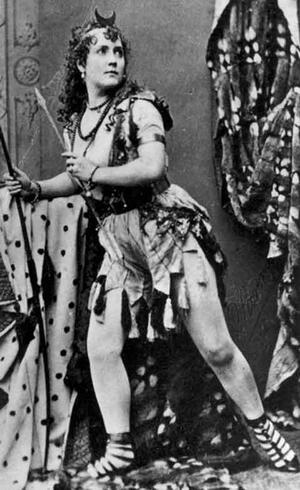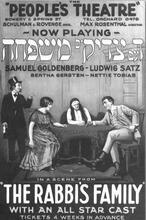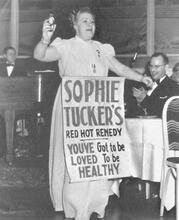Adah Isaacs Menken
In her short but remarkable life, actress Adah Isaacs Menken became legendary for her scandalous defiance of convention. Menken achieved international fame for her starring role in Mazeppa, where she played a role written for a man; in one scene she was stripped on stage to a flesh-colored body stocking and strapped to a horse, which raced on a narrow ramp above the theater. Despite her theatrical fame, Menken wanted to be known as a writer, penning essays on Judaism for The Israelite weekly paper as well as a collection of poems. She cultivated friendships with Charles Dickens, Dante Gabrielle Rossetti, and George Sand and had an affair with Alexandre Dumas. Menken learned Hebrew, refused to perform on the High Holidays, and protested for Jewish causes.
Acting Career and Fame
Internationally famous for her starring role in the equestrian melodrama Mazeppa, in which she was stripped on stage to a flesh-colored body stocking, lashed to the back of the “wild horse of Tartary,” and sent flying on a narrow ramp above the theater, Adah Isaacs Menken consistently defied social mores. She cropped her black hair and smoked cigarettes, and publicly disparaged conventional married life. Menken represented an early example of the cult of personality, blurring her private life with her public persona. Whether riding in a gaudy carriage through Central Park or exploiting the incipient art of photography to place her face in every shop window, Menken was expert at self-promotion and publicity. She married four times in the course of seven years. Her second marriage, in 1859, was to the heavyweight boxing champion of the world, John C. Heenan, with whom she had a son, who died in infancy. Menken had one other child, a son by her fourth husband, who also died in infancy in 1867.
Literary Following
One of the most glamorous celebrities of the 1860s, Menken also cultivated a literary following. She wrote poetry and developed relationships with the likes of Walt Whitman, Charles Dickens, Dante Gabriel Rossetti, Alexandre Dumas, and Algernon Swinburne. George Sand was a close friend to the actor and was godmother to Menken’s second child, whom Sand convinced Menken to have baptized. Pictures of the actor with Dumas, circulated in Paris where Menken was performing The Pirates of the Savannah, enflamed rumors that she was having an affair with the author, and shortly before her death, a similar scandal erupted in London when pictures were circulated of her with Swinburne.
Personal Life and Religion
Born in the spring of 1835, in Milneburg, Louisiana, to Auguste and Marie Theodore, Adah Isaacs Menken’s origins are ambiguous largely because she told different stories of her life to different audiences. A major bone of contention to this day is the authenticity of her Jewishness. Though scholars have some evidence that Menken was raised a Catholic and converted to Judaism only after marrying her first husband, Menken herself once publicly rebuked a journalist who labeled her a convert by announcing that she was “born in that faith [Judaism], and have adhered to it through all my erratic career. Through that pure and simple religion, I have found greatest comfort and blessing.” Whatever her origins, it is clear that Menken was fervently Jewish in her adult life. After moving to Cincinnati with her first and only Jewish husband, Alexander Isaacs Menken, Adah learned Hebrew fluently, studied classical Jewish texts, and contributed many poems and essays to The Israelite, a weekly founded by Rabbi Isaac M. Wise. Her poems indicate a passionate temperament, deeply committed to a kind of proto-Zionism and even messianism. Many are collected in the posthumously published volume Infelicia. Menken viewed herself as a modern Deborah, calling on Jews to rise up against persecution in Turkey and protesting the kidnapping of a six-year-old Jewish boy in Bologna by representatives of the Catholic Church. She was one of the few Jews in America to protest when Lionel Nathan was denied the seat in the English Parliament to which he had been elected. And, at the height of her acting career, she refused to perform on Jewish High Holidays. On her deathbed at age thirty-three, suffering from what may have been peritonitis or tuberculosis (or both), and treated by the personal doctor of Napoleon III, Menken was visited by a rabbi.
Adah Isaacs Menken died on August 10, 1868, in Paris. She is buried in the Jewish section of Montparnasse Cemetery.
Banner, Lois. American Beauty (1983).
Falk, Bernard. The Naked Lady or Storm over Adah: A Biography of Adah Isaacs Menken (1934).
Lesser, Allen. Enchanting Rebel: The Secret Life of Adah Isaacs Menken (1947), and “La Belle Menken.” In Weave a Wreath of Laurel: The Lives of Four Contributors to American Civilization (1938).
Lewis, Paul. Queen of the Plaza: A Biography of Adah Isaacs Menken (1964).
Menken, Adah Isaacs, Infelicia (1868).
NAW.






